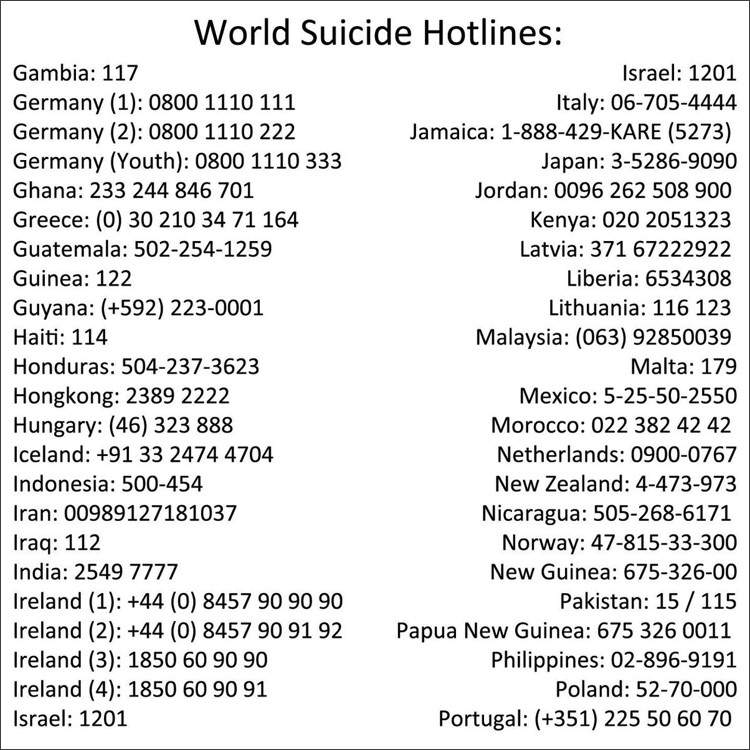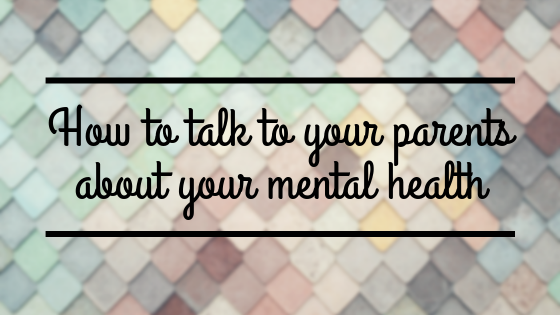Talking to a parent/guardian about mental health can be difficult and tricky for several reasons. Many people that I know who suffer from mental health problems have said how difficult it was to talk to their parents about it because they didn’t want to upset or disappoint them.
In this post, I will discuss common concerns people have with talking about their mental health with parents/guardians along with ways you can tell your parents you have mental health problems…
How will my parents react?
Talking about your mental health problems can be very scary, but the help available is worth it: psychologists, psychiatrists, psychotherapists, counsellours… The sooner you address your problems, the sooner you will feel start feeling better, and the better you will get in a shorter time.
It can be very scary talking to your parents about this. I know because I was in that very same position. What can help is to schedule a meeting with both of them in the room, or one at a time, completely up to you. Choose a time and place where you are comfortable and calm enough to speak and make sure you plan what you’re about to say beforehand to avoid sudden unexpected conversations.
You can also write a letter if you’re uncomfortable talking in person. A letter will allow you to express yourself without being pressured to reply right there and then. Even it seems scary because your family doesn’t talk about these things. You’re doing what is right for YOU and YOUR HEALTH.
Be honest with how you are feeling, and think about what support you need.

Will they be disappointed?
It’s hard for them not to feel that way. But it’s not entirely bad. My parents, for example, were more disappointed that they didn’t realise how bad things were. However, this doesn’t mean they are upset with you. They’re upset probably because they care about you a lot (more than you may think, I’m sure). Parents often wonder if there is anything they could do or have done differently.
Most times, it’s paranoia that makes you feel a disappointment in their eyes. It’s your mental health problems and illnesses speaking louder than yourself. It’s important to ask if these expectations are real or not. Think your feelings through and explain your fear of feeling like a disappointment.

They’ll probably be angry, right?
This is another concern for sufferers such as myself. I kept everything a secret for over a decade because I thought they’d be angry with me. For what reason, I still don’t know, because I cannot help how I feel, nobody can. When dealing with conflict, write everything down and plan a meeting with them. Explain that you are struggling, and could use all the help they can offer. If they dismiss you, reassure them that you are trying your best, and would like to speak to a professional.
Reacting angrily is usually out of fear. Your parents might not know how to react there and then because they’re worried about you and getting you appropriate help. Even if they don’t know the best way to respond, it is very important you speak up for yourself.

They’ll ask too many questions…!
Mine didn’t ask that many questions. They mostly just let me deal with things on my own accord, but of course, no parents are the same. Sometimes, parents will get upset and want to know everything you are experiencing mentally and emotionally. You may be unsure of what you are feeling and why. There are reasons why you don’t want to tell your parents every tiny detail of what you are going through, and it makes sense you want some privacy at the beginning.
It helps to review what you are comfortable sharing. Tell your parents you would like to talk to a psychologist as an outside source of knowledge and experience in this field. It may be unhealthy to hold things in because they will accumulate more than you think, so it is imperative that you are in a safe place when opening up.

One/Both of my parents is part of why I struggle…
If your parents have contributed to your wish to talk to a professional, there are many options you can choose from. If it’s just one parent you are concerned about, then talk to the other parent and explain how you are feeling. This might be an opportunity to reach out to other trustworthy adults like a GP or psychologist or teacher. While speaking with a trusted adult is not a substitute for proper treatment or medication, outside resources can guide you for the help you need.

They don’t believe me, and never will
Sometimes it’s hard for them to see what’s really going on, even if they care about you. This means labelling your struggles as “hormones” or “completely normal”. Ignoring problems doesn’t make them go away, and it’s important for you to continue asking for what you need. You can explain that despite hearing their beliefs, you’d like to speak to a specialist based on research and experience.
It may be unlikely they will change their minds, so take this as an opportunity to reach out to your GP or a psychologist in your area. These individuals could help you talk to your parents or put you in contact with treatment facilities. Despite your parents not validating your mental health problems, it doesn’t make them unimportant. If you think you need professional help, compile a list of reasons as to why. You can also speak to your friends about it.
There are also plenty of apps like BetterHelp and Talkspace, or online communities where you can ask for advice from professionals or people who are suffering from the same problems you are.


If you our someone you know displays any symptoms of mental health problems, please contact your local suicide hotlines, which you can find below.



